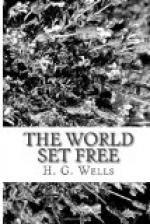If some curious god had chosen to watch the course of events in those northern provinces while that flanking march of the British was in progress, he would have found a convenient and appropriate seat for his observation upon one of the great cumulus clouds that were drifting slowly across the blue sky during all these eventful days before the great catastrophe. For that was the quality of the weather, hot and clear, with something of a breeze, and underfoot dry and a little inclined to be dusty. This watching god would have looked down upon broad stretches of sunlit green, sunlit save for the creeping patches of shadow cast by the clouds, upon sky-reflecting meres, fringed and divided up by masses of willow and large areas of silvery weeds, upon white roads lying bare to the sun and upon a tracery of blue canals. The pastures were alive with cattle, the roads had a busy traffic, of beasts and bicycles and gaily coloured peasants’ automobiles, the hues of the innumerable motor barges in the canal vied with the eventfulness of the roadways; and everywhere in solitary steadings, amidst ricks and barns, in groups by the wayside, in straggling villages, each with its fine old church, or in compact towns laced with canals and abounding in bridges and clipped trees, were human habitations.
The people of this country-side were not belligerents. The interests and sympathies alike of Holland had been so divided that to the end she remained undecided and passive in the struggle of the world powers. And everywhere along the roads taken by the marching armies clustered groups and crowds of impartially observant spectators, women and children in peculiar white caps and old-fashioned sabots, and elderly, clean-shaven men quietly thoughtful over their long pipes. They had no fear of their invaders; the days when ‘soldiering’ meant bands of licentious looters had long since passed away....
That watcher among the clouds would have seen a great distribution of khaki-uniformed men and khaki-painted material over the whole of the sunken area of Holland. He would have marked the long trains, packed with men or piled with great guns and war material, creeping slowly, alert for train-wreckers, along the north-going lines; he would have seen the Scheldt and Rhine choked with shipping, and pouring out still more men and still more material; he would have noticed halts and provisionings and detrainments, and the long, bustling caterpillars of cavalry and infantry, the maggot-like wagons, the huge beetles of great guns, crawling under the poplars along the dykes and roads northward, along ways lined by the neutral, unmolested, ambiguously observant Dutch. All the barges and shipping upon the canals had been requisitioned for transport. In that clear, bright, warm weather, it would all have looked from above like some extravagant festival of animated toys.




